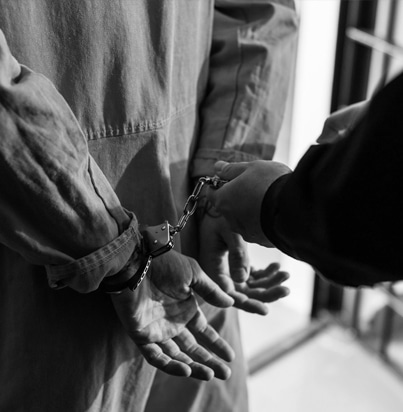Wrongful Convictions
The wrongfully convicted lose not only their freedom but pieces of their lives, including precious time with loved ones. Unfair circumstances and procedures, including misconduct, witness misidentification, and false confessions, can result in convicting a person of a crime they didn’t commit. Police Brutality Center is dedicated to seeking justice for innocent individuals imprisoned due to wrongful convictions.
Attorneys that work with Police Brutality Center may be able to assist you.
"*" indicates required fields
Content Last Updated: February 3, 2026
Spending time in prison for a crime you did not commit is a terrible injustice. Yet, it is estimated that thousands of Americans have been wrongfully convicted because of errors or misconduct during the investigation and trial.
The idea of imprisoning an innocent person seems inconceivable in a country that values justice, but it happens much more often than many people realize. The criminal justice system has exonerated thousands after wrongful convictions, but many remain behind bars. If the courts wrongfully convicted you or a loved one for a crime you didn’t commit, Police Brutality Center can help you fight for exoneration and justice.

What Is a Wrongful Conviction?
When the courts determine a person convicted of a crime is not guilty, it’s a wrongful conviction. Unfortunately, the United States has a long and troubling history of imprisoning innocent people.
One of the earliest recorded wrongful conviction cases in the United States was William Jackson Marion, who was convicted and then executed for the murder of a friend in 1887. Four years after Marion’s hanging, the public discovered the murdered friend was still alive. It was another century before he received a posthumous pardon.
Marion’s case is hardly an isolated event. Since then, the courts have exonerated thousands of wrongfully convicted criminals.
What Are the Causes of Wrongful Convictions?
Some wrongful convictions are due to genuine errors or misinterpretations of evidence. Others result from intentional manipulation by law enforcement, witnesses, and the court systems. Each wrongful conviction case is unique, but there are several common reasons for their occurrence:
Police misconduct: Police misconduct refers to inappropriate or illegal acts by law enforcement during an investigation. A 2020 study found that 35 percent of 2,400 wrongful convictions over a 30-year period involved police misconduct.
Faulty forensics: Forensic science is vital to criminal investigations, but it can be flawed, and many past convictions relied on outdated methods. Fortunately, advances in DNA analysis have helped free some exonerees from prison.
Mistaken eyewitness accounts: Eyewitness testimony may seem like compelling evidence in a courtroom, but it is notoriously unreliable. A 2022 report revealed that 67 percent of exonerations for sexual assault involved witness misidentification.
Manipulation and false confessions: A confession might seem like incontrovertible proof that a suspect is guilty, but many factors, including fatigue, deception, and manipulation, can lead suspects to confess to crimes they didn’t commit. Individuals who make false confessions typically must wait longer to receive full exoneration after release.
Jailhouse informants: Inmates in jails sometimes claim they heard a suspect confess to a crime. The most recent data from the National Registry of Exonerations shows that 8 percent of exonerees were convicted based on information provided by jailhouse informants.
Inadequate assistance of counsel: If a defendant’s counsel fails to thoroughly investigate and properly defend the charges, it’s much more likely that their client will be convicted. The attorneys in these cases may be negligent, inexperienced, poorly trained, or overworked.
The outcome is the same regardless of why a person is wrongfully convicted. They lose years—possibly decades—of their lives, waiting for the world to realize they were innocent all along.

Race and Wrongful Convictions
People of different backgrounds are victims of wrongful convictions, but studies have proven that Black Americans are wrongfully convicted at a disproportionate rate. According to a 2022 report from the National Registry of Exonerations, Black Americans are seven times more likely to be wrongfully convicted of serious crimes than white Americans.
This is partly because of the prevalence of racial profiling and the tendency to arrest and jail people of color at much higher rates than white Americans. Black Americans represent 13 percent of the United States population but 38 percent of the incarcerated population in jails and prisons.
Wrongful Conviction Statistics
It’s a common misconception that innocent people rarely go to prison. These alarming wrongful conviction statistics prove otherwise:
In 2022 alone, the justice system acquitted
245 wrongfully convicted Americans
after discovering they were innocent.
From 1989 to 2022,
3,284 people in the United States
were exonerated.
Experts estimate that wrongful convictions account for
up to 6 percent of criminal convictions,
resulting in prison time.
Exonerees released in 2021 spent an
average of 11.5 years in prison
for crimes they didn’t commit.
Even one wrongful conviction is a tragedy, but when thousands of currently incarcerated prisoners may be innocent, it becomes a crisis. The only solution is improving the criminal justice system and releasing wrongfully convicted individuals.
Notable Wrongful Conviction Cases
Examining a few wrongful conviction cases can help clarify how these situations occur and what you can do to correct them. These particular cases captured the public’s attention and highlighted the issue of wrongful convictions.
- The Central Park Five
In April 1989, a white woman was beaten and sexually assaulted while jogging through Central Park in New York City. Police took five boys between the ages of 14 and 16 into custody. After hours of interrogations, they confessed to committing the crime. They spent 13 years in prison until DNA evidence proved none were involved in the attack.
- Amanda Knox
Amanda Knox was studying in Italy in 2007 when her roommate was killed. She was convicted of murder in 2009 and sentenced to 26 years in prison. She filed and won an appeal in 2011 when the court determined her conviction relied on flawed DNA evidence and inadequate counsel. She later received a full acquittal in 2015.
- Adnan Syed
After being arrested in 1999 for the murder of classmate Hae Min Lee, Adnan Syed was convicted and received a life sentence. A judge vacated the conviction in 2022 because the state failed to share exculpatory evidence with his defense attorneys during the trial. Following the judge’s decision, prosecutors decided to drop the charges against Syed due to new DNA test results.
However, not long after Syed gained his freedom, the court reinstated the conviction because the victim’s family didn’t receive sufficient notice of the proceedings. Although Syed’s supporters argue the decision was due to a technicality rather than his innocence or guilt, the court determined they needed to hold a new hearing so the victim’s brother could attend. As of 2023, Syed is at home waiting to learn whether he will have to return to prison.

Legislation Around Wrongful Convictions
Several states have recently passed new or revised laws to help prevent and overturn wrongful convictions. These are some of the most notable changes:
- West Virginia passed House Bill 2888, which makes it easier for people to seek exonerations from convictions based on disproven or outdated science.
- Illinois banned police from using deception as a tactic when interrogating young suspects.
- Multiple states, including Washington and Ohio, passed laws requiring police to record interrogations.
- Virginia updated its Freedom of Information Act to allow the public to access files from closed police investigations.

In addition, state governments have made strides to help exonerees transition back into civilian life and compensate them for their suffering. Despite their innocence, they often struggle to find work, secure stable housing, and form social connections after release. As of 2023, 38 states and Washington, D.C., have laws to compensate wrongfully convicted individuals. However, the National Registry of Exonerations estimates that less than half of exonerees have received their payments.
In the past, when victims of wrongful convictions received compensation, they lost much of the sum to federal taxes. The federal government stopped this practice by passing the Wrongful Convictions Tax Relief Act of 2015.
How to Get Help for Someone Who Is Wrongfully Convicted
You might feel powerless when someone close to you is wrongfully convicted. With the right resources and guidance, there’s reason to hope. Follow these steps as you offer support:
Document any information you feel might be relevant to proving innocence.
Look for sources of financial assistance, such as crowdfunding platforms and social justice organizations.
Reach out to a skilled attorney who is knowledgeable about wrongful convictions.
Ensure you understand prisoners’ rights to help protect your loved one while they seek an acquittal.
If the wrongful conviction resulted from misconduct, consider working with civil rights lawyers to file a civil lawsuit and seek damages.
Fighting a wrongful conviction is an uphill battle, especially when working alone. Get legal help from Police Brutality Center to improve your chances of success.
